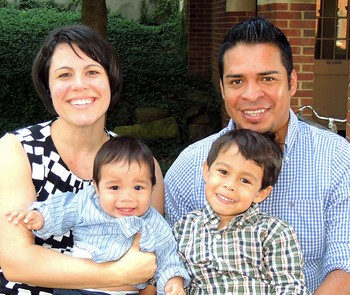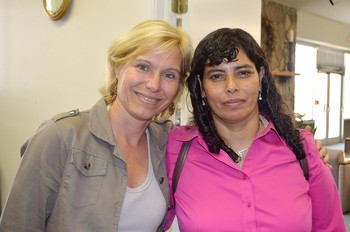An Advent letter from Amanda Craft, mission co-worker with her husband, Omar Chan, in Mexico and Guatemala.
Now after the wise men had left, an angel of the Lord appeared to Joseph in a dream and said, “Get up, take the child and his mother, and flee to Egypt, and remain there until I tell you; for Herod is about to search for the child, to destroy him.” Then Joseph got up, took the child and his mother by night, and went to Egypt, and remained there until the death of Herod. (Matt. 2:13-15)
I have read this part of Jesus’ birth story many times. However, as I hear more stories about how migrants are fleeing danger and extreme poverty in their homelands, I am challenged to read this story differently. How would I react if my child were in such danger? What would I do if I knew the only option to save my child was to flee? And what would that have been like for Mary and Joseph? What emotions and hardships would they have faced? As I reflect I am reminded of Gladys.
We met Gladys through El Paseo del Norte Center for Hope, an organization located in El Paso, Texas, that provides shelter and legal assistance for victims of human trafficking. The organization collaborates with border ministry programs in El Paso and Ciudad Juarez. We met Gladys during a visit from Human Trafficking Network, one of the Justice Networks of the World Communion of Reformed Churches. This was the first time she had shared her story publicly.
Gladys is a single mother from El Salvador. She is in her early 40s and life for her and her preteen son had become a constant struggle to survive. Gladys had a dream of a good job in the United States so she could provide a safe place for her son, away from the growing pressure of gangs, drug traffickers and organized crime.
Gladys only had to pull together $1,000 for the initial payment to the guide to start the trip. The man she paid said she could pay the rest of the debt as she worked in the U.S. Her family told her it was a scam—no one charged so little to take you to the U.S. and allow you to pay the remainder of the debt over time. However, she was determined to go. Gladys arranged to leave her son with family and prepared for her trip north.
At first the trip was exciting. She handed over her passport and money to the guide and was huddled onto a bus with others as they headed to Guatemala. All went smoothly. Crossing into Mexico became more complicated as the group traveled under a moonless sky, in small boats, across the river into Tapachula, Mexico.
There they were moved to safe houses and introduced to new “guides” who took them the rest of the way. Gladys’ excitement gave way to fear as she saw violent responses to several others in the group as they asked for basic needs such as water, food and bathroom facilities. Pangs from hunger and thirst became daily reminders of her increasingly dire situation. She stayed quiet and found comfort with several other young women who also were traveling alone.
After days in Tapachula, the group was moved quickly through Mexico on bus or truck transport. Nights were sleepless as guides violated and raped many of the young women. She thought many times about walking away, but knew this network of smugglers had information about her family and son. There was little choice but to continue forward.
Several days later, they arrived in the border city of Sonoita, Sonora, Mexico, across the border from Arizona. The group was advised they would leave at sundown to walk across the desert. With a gallon of water and few possessions, Gladys trekked across the desert scared and exhausted. Finally after a night of walking, they arrived at their pick up point. As she was shuttled in a rundown large passenger van, she asked the driver where they were going. He curtly responded, “You go where we take you.” Several times she heard the driver and guide talk about Arizona. She wasn’t supposed to go to Arizona; she was supposed to be going to family in California.
Once they arrived in a small house, she and about 10 young women were rushed in. This was the first time she became really frightened. The last question she asked was responded to with a hit to her head so hard she blacked out. The next thing she remembers is another man walking into the room packed with young women shivering from fright and worry. He calmly explained to them that they were here to work off the debt they incurred during their travel north. If they chose not to work off their debt or seek help from the police, he would report them to Border Patrol and then seek payment from the family members they left behind. Gladys knew that if she did not follow orders, her son’s life would be in danger. This is how Gladys’s life in forced prostitution began.
Gladys’s nightmare continued night after night, but it did not extinguish her valor. During the day, as the women were locked in the small house, Gladys would look for a way to escape. After almost a year, she had endured enough and thought through a plan. She and a few other young women escaped over the block fence dividing the neighboring homes. They stumbled out of the house and were fortunate to escape and make their way to Houston, Texas, with the help of an undocumented gardener who also was looking for a new start.
During her time in Houston, Gladys learned how to prepare food and run her own street food cart. In less than two years, she owned four different carts that the other young women helped her run. They were able to rent an apartment and purchase an older vehicle. She was sending regular payments to help with her son’s education and living expenses. For the first time, the future looked bright. She had escaped a life of hardship and violence in El Salvador.
Those dreams came to a crashing halt when a large pickup pulled up to her in the parking lot in her apartment complex one night and she saw one of the men who had held her captive in the Eloy, Arizona, brothel. He jumped out of the truck. She ran, but he was on her quickly. She lashed out at him and screamed. He struggled to pull her into the vehicle. Neighbors called the police who arrived promptly. Gladys was relieved.
However, the police did not handcuff the man, but handcuffed her. The police told her that there was a deportation order on file for her. She was suddenly rushed into the deportation process. Within weeks, she was back in El Salvador.
Her life in El Salvador was unfamiliar. She had been gone too long. Her son no longer knew her. She no longer knew him. Her family was resentful. Only one solution came to mind, she had to head to the U.S. once again. Her life was there, and her son’s future depended on it, too.
This time she traveled on her own. With a little money she had sent to her son, Gladys started her trek back to the U.S. Since she knew the way, this time she was able to ask for assistance from truck drivers. She was lucky; they treated her kindly and took her where she needed to go. As she neared the border, her anxiety grew.
She knew what she had to do, but it was still extremely scary to think about following her plan. She had to turn herself into U.S. Border Patrol. During her time in the deportation center, she had learned her rights and understood she had a strong case in her favor. She could give dates, times, locations and other information about the trafficking ring that landed her in Eloy, Arizona. All she had to do was persuade a judge to listen to her.

Amanda Craft and Omar Chan with their children at a mission co-worker orientation. —Photo provided
After spending three years in New Mexico, a judge finally was exhausted from listening to her story. Each court appearance she refused to sign the deportation agreement based on reasons of human trafficking. Finally, he understood that this would go nowhere, and he processed her case and allowed legal counsel. The Paseo del Norte Center for Hope stepped in to provide her pro-bono legal counsel and cover her living expenses during the trial. When we spoke with her in July 2015, her trial had just ended. Several members of the trafficking ring were found guilty, and she was offered a path to residency in the U.S., due to her assistance in the case.
Gladys started her long journey north forced by dire consequences in her homeland, much like how the angel urged Joseph to take Mary and Jesus out of Bethlehem seeking safety in a foreign land. Gladys made the decision on her own to make the trek north, choosing to be smuggled to her destination.
However, during her trip, she quickly became aware that her freedom and ability to protect herself had been taken. She became a victim of human trafficking and forced into the sex trade. It is difficult to quantify the number of trafficked victims around the world, including in the U.S., due to their relative invisibility and lack of agency and understanding. However, Kevin Bales, the CNN Freedom Project Ending Modern Day Slavery, estimates that between 14,500-17,500 individuals are trafficked into the U.S. each year.
Gladys’s own tenacity and understanding of her rights proved unshakeable in this incidence. She is lucky to be alive, and she is blessed to be free. Gladys is clear that without her own faith and without the faithfulness of others, she would not be sharing her story. This reminds me how the angel warned Joseph of danger and encouraged him to seek safety for his family.
It is God’s good work that I can share Gladys’s words with you. We know and understand that God provides a multitude of people to help bring about goodness in this world. It takes partners along the U.S.-Mexico border to step out and strive to stop human trafficking. It takes partners in churches around the U.S. to provide the financial assistance needed for us to be a part of this work, to be not only witnesses, but also to provide comfort and care as victims walk through the system.
-----
Serving Presbyterian World Mission on the US-Mexico border, Amanda Craft, regional liaison for Mexico and Guatemala, and her husband Omar Chan, facilitator, Presbyterian Border Region Outreach, are available to visit congregations or organizations. Read their letters and support their ministry.

